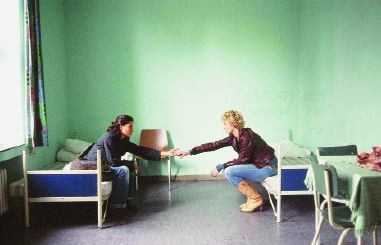The Edge of Heaven

Most of The Edge of Heaven feels like a shaggy dog story. It’s not until well into the second half of the film that writer-director Fatih Akin shows where he’s headed with his tale.
The first of the movie’s three acts focuses on the relationship between a pair of Turkish émigrés living in Bremen, Germany. Ali (Tuncel Kurtiz) is a lonely widower who enlists the services of a prostitute named Yeter (Nursel Köse), who calls herself Jessy and wears a blonde wig. Muslim fundamentalists track her down and threaten her if she doesn’t abandon her sinful life. Ali offers to take her in—to pay her to live with him—and she agrees. This section is called “Yeter’s Death,” but Akin fakes us out: yes, the character dies, but not at the hands of these strong-arming Muslims.
In the wake of Yeter’s death, Ali’s son, Nejat (Baki Davrak), a professor, travels to Istanbul in search of Yeter’s daughter, Ayten. He settles down there, buys a German-language bookstore from a German émigré who has grown homesick for the country of his birth (the exchange between these two young men is very sweet) and distributes copies of a photograph of Ayten in hopes of locating her.
But Ayten (Nurgül Yesilçay) is actually in Germany. And unbeknownst to Nejat, their paths have already crossed at his university, as we learn in act two. She’s a revolutionary who had to leave Turkey to avoid prison. Her contacts in Germany, ironically, are the same Muslims who threatened her mother. She hangs around the university because the food is cheap, and there she meets Lotte (Patrycia Ziolkowska), a student who puts her up—over the objections of her mother, Susanne (Hanna Schygulla)—and then becomes her lover.
It isn’t until Ayten is arrested and Lotte goes to Istanbul to try to help her (renting a room from Nejat) that the parts of the story fall ingeniously into place. The six major characters represent three sets of parents and children who have become alienated from each other; the geographical dislocation of all six at different parts of the movie, as they each seek new homes, is both a mechanism and a metaphor for the fracturing of these relationships and the impulse to repair them.
The movie is deeply and unexpectedly affecting. It’s also beautifully acted. The fact that the rhythms of the two German actresses are distinct from those of the four Turkish performers underscores the differences in the way the two cultures reveal layers of feeling. The sensitivity of Akin, a Turk born in Hamburg, to those differences is part of what gives the film such an unusual emotional palette.
The film’s method of pulling together several narrative strands is somewhat reminiscent of Crash and Babel, but those movies were rigged to make sociological points. By contrast, The Edge of Heaven doesn’t contain a single sequence that feels phony. Akin resists making blanket statements about the behavior of his characters, even in highly charged political situations, and he develops all six of the characters in a way that shows our initial impressions of them to be inadequate, if not dead wrong.
The film begins and ends with the Turkish Feast of Bayram, which commemorates a story the Qur’an shares with the Old Testament: God’s restoration of Isaac to Abraham (Ibrahim). Nejat recalls that as a child he was terrified by this story of God’s commanding a father to sacrifice his son, and that he asked his father how he would have acted in Ibrahim’s place. Ali swore that to protect his son he would even have made an enemy of God, an instinct that would keep him on the edge of heaven. The phrase is wonderfully ambiguous.





